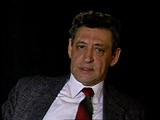<< Previous | Displaying results 41-50 of 571 for "" | Next >>
-
Alisa (Lisa) Nussbaum Derman describes partisan activities
Oral HistoryLisa was one of three children born to a religious Jewish family. Following the German occupation of her hometown in 1939, Lisa and her family moved first to Augustow and then to Slonim (in Soviet-occupied eastern Poland). German troops captured Slonim in June 1941, during the invasion of the Soviet Union. In Slonim, the Germans established a ghetto which existed from 1941 to 1942. Lisa eventually escaped from Slonim, and went first to Grodno and then to Vilna, where she joined the resistance movement. She…
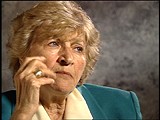
-
Dorotka (Dora) Goldstein Roth describes conditions in the Vilna ghetto
Oral HistoryAfter the Germans invaded Poland in 1939, Dora's family fled to Vilna, Lithuania. When the Germans occupied Vilna, Dora's father was shot and the rest of the family was confined in the Vilna ghetto. Dora, her sister, and her mother were deported to the Kaiserwald camp in Latvia and then to the Stutthof concentration camp near Danzig. Her mother and sister perished in Stutthof. Dora herself was shot immediately before liberation, but she survived.

-
Nesse Galperin Godin describes the formation of the Siauliai ghetto
Oral HistoryNesse's family had a dairy business. The Germans occupied Lithuania in 1941 and established a ghetto in Siauliai. Nesse lived in the ghetto until 1943 when she was old enough to work. In 1944 Nesse, her mother, and a brother were deported to the Stutthof camp near Danzig. Nesse worked in several Stutthof subcamps until January 1945, when the inmates were put on a death march. She was liberated by the Soviets in March. Nesse, her mother, and two brothers survived, and she arrived in the United States in…
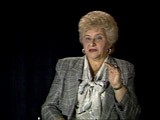
-
Fritzie Weiss Fritzshall describes deportation in cattle car to Auschwitz
Oral HistoryFritzie's father immigrated to the United States, but by the time he could bring his family over, war had begun and Fritzie's mother feared attacks on transatlantic shipping. Fritzie, her mother, and two brothers were eventually sent to Auschwitz. Her mother and brothers died. Fritzie survived by pretending to be older than her age and thus a stronger worker. On a death march from Auschwitz, Fritzie ran into a forest, where she was later liberated.
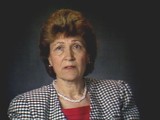
-
Leo Schneiderman describes conditions on a freight car during deportation from Lodz to Auschwitz
Oral HistoryThe Germans invaded Poland in September 1939. Leo and his family were confined to a ghetto in Lodz. Leo was forced to work as a tailor in a uniform factory. The Lodz ghetto was liquidated in 1944, and Leo was deported to Auschwitz. He was then sent to the Gross-Rosen camp system for forced labor. As the Soviet army advanced, the prisoners were transferred to the Ebensee camp in Austria. The Ebensee camp was liberated in 1945.
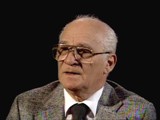
-
Leo Schneiderman describes routine at the Ebensee camp
Oral HistoryThe Germans invaded Poland in September 1939. Leo and his family were confined to a ghetto in Lodz. Leo was forced to work as a tailor in a uniform factory. The Lodz ghetto was liquidated in 1944, and Leo was deported to Auschwitz. He was then sent to the Gross-Rosen camp system for forced labor. As the Soviet army advanced, the prisoners were transferred to the Ebensee camp in Austria. The Ebensee camp was liberated in 1945.
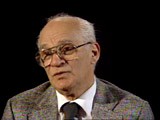
-
Saul Ingber describes forced labor and brutality in the Gusen subcamp of the Mauthausen concentration camp
Oral HistorySaul grew up in a religious Jewish family. He was trained as a tailor. In 1939 he was sent to forced labor along with most of the young men of his town. He worked in many different labor camps before being deported to the Mauthausen concentration camp system in 1944. While working there, Saul's hand was broken by an SS guard. He eventually ended up in the hospital in the Dachau camp. He was liberated by US troops in May 1945. After the war he returned to his hometown and was reunited with his sister. They…
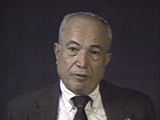
-
Norbert Wollheim describes a roundup of Jews in Berlin
Oral HistoryNorbert studied law and was a social worker in Berlin. He worked on the Kindertransport (Children's Transport) program, arranging to send Jewish children from Europe to Great Britain. His parents, who also lived in Berlin, were deported in December 1942. Norbert, his wife, and their child were deported to Auschwitz in March 1943. He was separated from his wife and child, and sent to the Buna works near Auschwitz III (Monowitz) for forced labor. Norbert survived the Auschwitz camp, and was liberated by US…
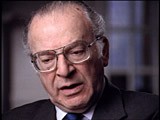
-
Norbert Wollheim describes deportation from Berlin
Oral HistoryNorbert studied law and was a social worker in Berlin. He worked on the Kindertransport (Children's Transport) program, arranging to send Jewish children from Europe to Great Britain. His parents, who also lived in Berlin, were deported in December 1942. Norbert, his wife, and their child were deported to Auschwitz in March 1943. He was separated from his wife and child, and sent to the Buna works near Auschwitz III (Monowitz) for forced labor. Norbert survived the Auschwitz camp, and was liberated by US…
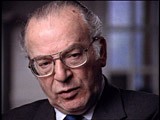
-
Norbert J. Yasharoff describes the trial and sentencing of a Jewish man falsely charged with economic crimes
Oral HistoryAnti-Jewish measures took effect in Bulgaria after the beginning of World War II. In March 1941, Bulgaria joined the Axis alliance and German troops passed through Sofia. In May 1943, Norbert and his family were expelled to Plevin in northern Bulgaria, where they stayed with relatives. After the advance of the Soviet army in 1944, Norbert and his family returned to Sofia.
